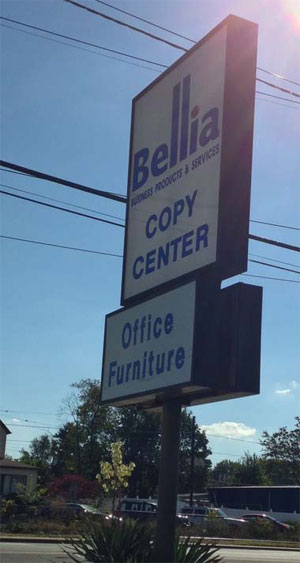Author Archives: Bellia Office Furniture
The Myth of Multi-Tasking
Task sharing or multi-tasking—switching from focused to unfocused tasks and back—takes time. According to research, it takes approximately 15-20 minutes to recover from every interruption.
Office Etiquette 101
Not so long ago, offices were places where legions of similarly dressed people all arrived at the same time to sit aligned in neat rows and perform nearly identical tasks. At lunchtime, they vacated the workspace for an hour to come back refreshed and ready for an afternoon of highly predictable behavior. It was boring — but at least you knew what to expect from others and how to act.
That was then. This is now: offices are getting smaller and closer together, some people share offices and others don’t have any assigned office, and there are more meeting spaces mixed in with cubicles.
Alternative Workplace Strategies in the Current Economy
Leading organizations have been employing alternative workplace practices (AW) for over two decades—as far back as 1989 when IBM began piloting AW options—and long before the word “Internet” became part of the common lexicon. But for many years they were mainly the practices of a select few companies. They remained mostly experimental and retained their unique identities. Today, however, alternative workplace may be shedding half its name, and becoming simply “workplace” as such practices become mainstreamed in many organizations. This is the conclusion of a study released by New Ways of Working (New WOW), a member organization focused on holistic solutions for new ways of working.
Designing Across Generations
Can Gen-Y multi-task better than other generations?
Today’s workplaces are comprised of members of Generation Y, Generation X, Baby Boomers, and Traditionalists. (Crocker, 2007; Cowell, 2009) Of course, people of multiple generations have always worked together. But unlike past generations—such as the farming families of the Dark Ages—the current workforce’s older and younger members’ life experiences and worldviews have little in common. This has raised the question of whether Gen-Y workers need different workspaces than their older colleagues.
Are Gen-Y’s Brains “Modular” or “Unconscious”?
Many people assume that younger workers can process information in fundamentally different ways than their older counterparts. This paper reviews research relevant to that assumption and explores the association between office design and communication styles.
Congratulations to the SNJBP 40 Under 40 Award Recipients
Congratulations to the SNJ Business People 40 Under 40 2014 Award Recipients.
Thank you for your outstanding commitment and continued dedication to making South Jersey the best place to live, work and raise a family in the areas of business, leadership, arts and culture, education and philanthropy.
Anthony K Bellia
Company Name: Bellia Office Furniture
Title: President
Age: 34
Education/Experience: BA in Finance Rider University. GAP Program Drexel University. Coach for Dale Carnegie.
Personal Motto: Don’t take life too seriously…No one makes it out alive anyway
Business Philosophy: We grow the business by remaining true to our founder’s principles:
- Honesty and integrity
- Mutual respect for each other
- Commitment to superior customer service
- Hard work and dedication
- Fun and pride in what we do
Accomplishments: Currently serve on the Gloucester County Workforce Investment Board and the Comprehensive Economic Development Strategy committee; Taking over a third generation Family business and not messing it up (yet); Getting Engaged and buying a house with a girl from
Wisconsin who makes cheese.
People would be surprised to know: I am a black belt in Tang Soo Do and I was pushed out of a perfectly good airplane twice; won’t fall for that trick for a third time.
Bellia Celebrates 40 Years in Business
 In 1973, Bellia Enterprises opened its doors for business. Back then, the company was just a small print store in Woodbury. Now, the Bellia name is known throughout the area with a print and design location in both Glassboro and Woodbury, and a furniture and office supply store in Woodbury.
In 1973, Bellia Enterprises opened its doors for business. Back then, the company was just a small print store in Woodbury. Now, the Bellia name is known throughout the area with a print and design location in both Glassboro and Woodbury, and a furniture and office supply store in Woodbury.
This year, the family owned business is celebrating its 40th anniversary and is holding a Customer Appreciation Day on October 23, complete with food and giveaways.
The company takes root in Woodbury when Salvatore and Nancy Bellia bought McGrail Printing in 1973. Throughout the years, the company has shifted from working with traditional printing to an all-digital process.
Bellia Enterprises also faces some competition from big-name companies. Print Manager Andrew Bellia, Salvatore and Nancy’s grandson, said that it does get a little difficult, but their presence in the community has given them the upper hand, as their customers range from politicians to Rowan University.
“We take a higher road,” he said. “But we live here, we work here, and we’re involved here, so we’re a part of everything.”
Bellia credits 40 years in business to the company’s dedication to customer service, a dedication started by Bellia’s grandparents, father, and uncle.
“We have a family-type environment,” he said. “We treat everyone like our family.”
Bellia, who has spent his whole life working for the company, noted that the family members working in the company, Tom, Anthony Sr., Fran, Joann, Tom, Anthony Jr., Sal, and Michael Bellia, are all very proud of the business.
“My family takes pride in this business,” he said. “I think the key to our success is that we have a big family that are all involved and all passionate about this.”
Bellia also mentioned that there are plans of bringing the next generation of Bellias into the family business.
“We’re lucky to be a part of this,” he said. “It’s a great gift from my grandpa, my dad and uncle, and we’re honored to take it to the next generation.”
written by Jennica Torio, South Jersey Times
The Conference Room: Pass it On
South Jersey is home to many family businesses that are generations strong. While the chemistry among relatives can help build up the strength of the business, things can get tricky when it comes time to divvy up responsibilities. So we asked these two local professionals for advice on how to delegate, especially when it comes time to pass on the reins.
 Ray Rastelli
Ray Rastelli
Owner, Rastelli Foods Group
“When you build a company from the ground up, you take on all tasks necessary to make it successful. Family members should do the same—learning every facet of responsibility within the business. If they understand what it takes to build and sustain your family business, they won’t take your success for granted. When it comes time to pass the reins, I want to be sure that my family members are adequately prepared to take on the necessary responsibilities and understand the importance of each task. My son and niece have worked in every capacity at Rastelli Foods Group. His responsibilities have ranged from overnight stockroom shifts to checking cattle operations in South Dakota. She has done everything from food prep at our market to planning major corporate events. Each experience was vital to their ability to perform in their current executive roles and to the future of our company.”
 Anthony K. Bellia
Anthony K. Bellia
President, Bellia Office Furniture
“We started the process of passing the reins about five years ago. Then this time last year, we made our first leap into our new leadership roles. It’s clearly not something that happened with a flick of a switch but something that was carefully executed through substantive dialogue with my business partners and succession planning coach. When the time came to delegate responsibilities, we started with a conversation about how individuals in these roles operate at maximum effectiveness. It was clear to me from this dialogue that I was not entitled to my position as president just because my name ended in Bellia. You need a GAP analysis to ensure that the person you are delegating possesses the necessary skill sets. The analysis is meant to shore up areas for your success in that area of responsibility, and without this analysis there is nothing to hold each other accountable for, which is critical for an effective transition.”
Published (and copyrighted) in South Jersey Biz, Volume 3, Issue 5 (May, 2013).

All in the Family
 South Jersey family businesses are thriving thanks to inherited values and traditions.
South Jersey family businesses are thriving thanks to inherited values and traditions.
When Anthony Bellia Jr. was young, he was already thinking about running the family business. “I would sit at my father’s desk and tell him that I was going to take over the company,” says Bellia, the third-generation president of Bellia Office Furniture in Woodbury.
Companies as big as Holman Automotive, a family-run company since 1924, and Ravitz ShopRite, family-owned since 1938, have become staples in the South Jersey business world, creating a solid name for customers and associates to rely on. Bellia Office Furniture joins the ranks of family businesses across the area, large and small, that are passing on the groundwork for a successful business to younger generations.
Since opening in 1980, the Gloucester County business has been family owned and operated, moving from grandfather Salvatore to Anthony Sr. and his brother Tom, and finally to their sons Anthony Jr., Sal, Andrew and Michael.
“My grandfather started this company to provide for his family,” Bellia says. “He said to himself, ‘I
can go work for someone else, or I can create something for my family’s future.’”
A Family Affair
One of the toughest things facing family businesses is the transition from one generation to the next—maintaining the company while staying up-to-date on traditions and policies.
“My father and my uncle had very similar goals as my grandfather,” Bellia says. “They started the furniture business to really make something bigger and build even more for the future.” Salvatore opened Bellia Printing & Copy in Woodbury in 1973 and the furniture business followed seven years later. When it was time for Anthony and the rest of the third generation to take over, they were prepared and anxious to continue their family’s decades of success.
However, not all inheritances run that seamlessly. For brothers Rob and Carlos Santiago, now the chief operating officer and vice president, respectively, of Para-Plus Translations in Barrington, the idea never crossed their minds. Their mother, Sonia, started the translation company in the dining room of their home in 1980, with no solid plans to pass the business onto her children.
“We were never groomed to take over the company and there was never any pressure,” Carlos says. “When we started out here, we didn’t think of it as more than a summer internship.”
“I think that our mother had always hoped that we would take over one day,” Rob agrees. “But she made it clear it was our decision.”
Both brothers went on to their own careers—Rob was the manager of an engineering firm while Carlos was a physics teacher—but, like many family-owned businesses across the country, the tie to home pulled them back. “When our mom needed help setting up a few technical things for the company one summer, I came in to help,” says Carlos. “I’ve been here ever since.”
Family Values
In an economy where a business needs to stand out to succeed, family-owned businesses have the leg up. That’s because they have their moral code and business strategy embedded among employees from the start.
The closeness of family businesses to their customers also allows the business to know exactly what their customers want.
“Our customers tend to know what the best products are,” says Mike Casey, second-generation co-owner of ABC Discount Appliances, with locations in Marlton, Pennsauken and Medford. “Our size and our dedication to service allow us to provide the best products available to our customers.”
“We learned from a young age,” Bellia says. “We all worked at the store and had those values really stressed to us.” Values like customer relations and quality service that, according to Bellia, are taught and passed on through a lifetime of involvement.
Family businesses have the unique opportunity to develop close connections with their customers because they are more than just businesses, they are institutions. “Customers like to know they get personal attention,” Bellia says. “They can see you care about more than just the product. They can see you care about the community.”
The Chain of Command
The struggle in managing a family business can come from balancing a successful company with a healthy family life. As succession approaches, the choice of hiring a new leader can cause family tension, but the Santiagos know that examining the strengths and weaknesses of each family member can protect personal feelings while ensuring a successful foundation for the company.
“We took different roles based on the needs of the company,” Carlos says. “Rob had experience running a company and I had more technical experience. I had no problem letting him run it because in the end we both bring our own perspectives and skills to the company. … We were very respectful.”
For Casey, the business reached into a more extended family. As he took over in his father’s seat, ABC’s other partner, Rick Super, was handing down the reins to his son, Rick Super Jr.
“It’s 50-50. Decisions are jointly met,” explains Casey. “He handles office; I handle logistics. We both get involved in every aspect.”
The Bellias recently went through a transition period of their own as the second generation left and the third took hold.
“When we were growing up, it was made clear that we couldn’t assume ownership,” Bellia says. “We were told that we could always have a job here, but if we wanted to make this our career, we needed to meet certain requirements.”
Businesses in situations like this, where there are multiple family members ready to take the reins, can hire a succession consultant whose job it is to prepare the family for the changeover. Brian Donnelly specializes in business succession planning for the law firm of Donnelly Ritigstein in Moorestown.
“Families will usually leave it to us to craft a succession plan,” Donnelly says. “It’s our job to figure out the dynamic that best suits the family and the business.
“The first step is to ask the parent if they’ve talked about handing the company down to their
children,” he says. “If they say no, we have to make sure that it’s something the child actually
wants to do. From there we can start working.”
Donnelly and other succession consultants make sure that any person who may want to take
over has the capability to do so before moving the family in any new direction.
“Having a consultant was critical for having a smooth changeover to the new generation,” Bellia says.
Where the Heart Is
Family businesses may be an investment, but it’s also important they stay invested in the family itself. Balancing a personal life is just as important as keeping the books balanced. “We can get at each others’ throats sometimes,” Bellia admits. “You really have to keep family and personal emotions out when it comes to the business.”
For Casey, he has the unique situation of handling a company owned by two separate families. “Sometimes if your business partners aren’t family it can be tough,” says Casey, who is working alongside his childhood friend to build a new family business that both of their fathers would be
proud of. “We’re fortunate that we grew up together; there’s a strong relationship.”
No matter what the ownership situation or type of business, they all recognize where priorities lie. “It’s one thing to lose a job,” Carlos says. “It’s a whole different thing to lose a family member. We just try to stay respectful, and I think I am much closer to both my brother and my mother because of it.”
written by Alex Young. Published (and copyrighted) in South Jersey Biz, Volume 2, Issue 5 (May, 2012).
Relationship Advice
Local companies keep V.I.P. customers content with perks ranging from industry insights to nights on the town.
Clients of SHM Financial Group in Voorhees have stuck with the company for decades because they like the personal service and levelheaded financial advice.
But, admits company president Stanley Molotsky, the private dinners at Capital Grille and Le Bec-Fin, the Phillies box seats and the outings to the Walnut Street Theater don’t hurt either.
“The impact [of these programs] is just general goodwill,” says Molotsky, whose company has been offering such events to its top clients for around 15 years. They also hold season tickets to the Phillies, Flyers, Eagles and Sixers—and distribute those tickets liberally. “It’s a way of giving back to clients who are faithful to us, and who continue to refer other quality people to our firm.”
When it comes to perks for loyal customers, local companies have moved way beyond free pens and fruit baskets at the holidays. Today, outstanding customer service means building relationships on both personal and professional levels, while offering benefits others don’t.
“It’s a way to help ensure long-term profitability,” says Maureen Morrin, professor of marketing at Rutgers University School of Business in Camden. “If you keep your customer very happy, then, if a competitor comes along, they’re less likely to switch.”
To calculate what benefits offer the most value to a given client, identifying the needs of your client base is crucial.
“It’s very, very important for businesses to understand as much as they possibly can about each and every person that does business with them, in a way that they can almost build a profile of a typical client,” says Mark Newell, a marketing consultant with the New Jersey Small Business Development Center at Rutgers University-Camden. “The more they know about the individual clients, the best they can serve their needs.”
For example, Bellia Office Furniture in Woodbury targets major corporations concerned with creating cutting-edge workplaces that will entice the brightest workers and offer them an environment where they can succeed.
“A lot of our clients are looking to us for knowledge. They want to know what the latest workplace trends are in the marketplace,” says Anthony Bellia, partner at Bellia Enterprises and director of sales at Bellia Office Furniture.
To that end, the company provides existing and potential clients, mainly Fortune 1,000 corporations, with an all-expense-paid trip on a private jet to tour the Michigan headquarters and showroom of their manufacturer, Haworth. “When we do these trips, the client is highly qualified—so we’re not just doing it on a whim. The client is very interested in learning about Haworth, and it’s meant to be a true working session,” he says. “It sounds like a lot of glitz and glamour, but we want to show them that we’re going to build it right.” The private jet might be nice, says Bellia, but the market insights are the most valuable perk for his client base.
The goal of all this is to build a relationship, but also, most importantly, to build trust. “It is not just about selling product,” he adds. “We provide the level of knowledge that is important to them—because anyone can sell office furniture.”
After all, adds Molotsky, all the schmoozing in the world won’t matter if you don’t follow the three cardinal rules of interacting with customers: “Be honest with them, be honest with them and be honest with them.”
Transparency is especially crucial in moments of crisis, Molotsky says.
But it’s just as important to keep open lines of communication on a daily basis, adds Newell. He says a simple step is to send out a company newsletter that is not about selling, but rather about educating.
“It helps to develop credibility in the company,” says Newell. “I’m not just interrupting your day and trying to sell you the next, higher-level, newest model of what it is we’re carrying, and I’m not bragging about my employees, etc. I’m sending you useful information that you can use in your everyday life, that has something to do with the service that I provide.”
For important clients, that communication needs to go both ways. That’s why, at TD Bank, all business clients receive the cell phone numbers of their local store managers, according to Linda Verba, executive vice president and head of store operations and service programs. “Our business clients always have access to our store managers for whatever they need,” she says.
The bank has also created a significant but cost-effective perk for its important clients. It hosts V.I.P. networking receptions at all its stores on a regular basis, allowing clients not only to enjoy a social outing, but also to expand their own business networks.
But whether you’re hosting a group event or a one-on-one meeting, face-time with valued clients is crucial, Molotsky notes.
“You’re the one they want to see: you’re the representative of the business to them,” he says. But that doesn’t mean clients will want to talk shop.
“We prefer not to talk business,” at social customer appreciation events, he says. On the other hand, “if a client brings it up, we’re more than happy to discuss it.”
written by Lucia Patalano. Published (and copyrighted) in South Jersey Biz, Volume 1, Issue 7 (July, 2011).










